Thesaurus : Doctrine

► Full Reference: R. Sève, "Compliance Obligation and changes in Sovereignty and Citizenship", in M.-A. Frison-Roche (ed.), Compliance Obligation, Journal of Regulation & Compliance (JoRC) and Bruylant, "Compliance & Regulation" Serie, to be published
____
📘read a general presentation of the book, Compliance Obligation, in which this article is published
____
► Summary of the article (done by the Journal of Regulation & Compliance - JoRC):
The contribution describes "les changements de philosophie du droit que la notion de compliance peut impliquer par rapport à la représentation moderne de l’Etat assurant l’effectivité des lois issues de la volonté générale, dans le respect des libertés fondamentales qui constituent l’essence du sujet de droit." ("the changes in legal philosophy that the notion of Compliance may imply in relation to the modern representation of the State ensuring the effectiveness of laws resulting from the general will, while respecting the fundamental freedoms that constitute the essence of the subject of law").
The contributor believes that the definition of Compliance is due to authors who « jouer un rôle d’éclairage et de structuration d’un vaste ensemble d’idées et de phénomènes précédemment envisagés de manière disjointe. Pour ce qui nous occupe, c’est sûrement le cas de la théorie de la compliance, développée en France par Marie-Anne Frison-Roche dans la lignée de grands économistes (Jean-Jacques Laffont, Jean Tirole) et dont la première forme résidait dans les travaux bien connus de la Professeure sur le droit de la régulation. » ( "play a role in illuminating and structuring a vast set of ideas and phenomena previously considered in a disjointed manner. For our purposes, this is certainly the case with the theory of Compliance, developed in France by Marie-Anne Frison-Roche in the tradition of great economists (Jean-Jacques Laffont, Jean Tirole) and whose first form was in her well-known work on Regulatory Law").
Drawing on the Principles of the Law of the American Law Institute, which considers compliance to be a "set of rules, principles, controls, authorities, offices and practices designed to ensure that an organisation conforms to external and internal norms", he stresses that Compliance thus appears to be a neutral mechanism aimed at efficiency through a move towards Ex Ante. But he stresses that the novelty lies in the fact that it is aimed 'only' at future events, by 'refounding' and 'monumentalising' the matter through the notion of 'monumental goals' conceived by Marie-Anne Frison-Roche, giving rise to a new jus comune. Thus, "la compliance c’est l’idée permanente du droit appliquée à de nouveaux contextes et défis." ("Compliance is the permanent idea of Law applied to new contexts and challenges").
So it's not a question of making budget savings, but rather of continuing to apply the philosophy of the Social Contract to complex issues, particularly environmental issues.
This renews the place occupied by the Citizen, who appears not only as an individual, as in the classical Greek concept and that of Rousseau, but also through entities such as NGOs, while large companies, because they alone have the means to pursue the Compliance Monumental Goals, would be like "super-citizens", something that the digital space is beginning to experience, at the risk of the individuals themselves disappearing as a result of "surveillance capitalism". But in the same way that thinking about the Social Contract is linked to thinking about capitalism, Compliance is part of a logical historical extension, without any fundamental break: "C’est le développement et la complexité du capitalisme qui forcent à introduire dans les entités privées des mécanismes procéduraux d’essence bureaucratique, pour discipliner les salariés, contenir les critiques internes et externes, soutenir les managers en place" ("It is the development and complexity of capitalism that forces us to introduce procedural mechanisms of a bureaucratic nature into private entities, in order to discipline employees, contain internal and external criticism, and support the managers in place") by forcing them to justify remuneration, benefits, and so on.
Furthermore, in the words of the author, "Avec les buts monumentaux, - la prise en compte des effets lointains, diffus, agrégés par delà les frontières, de l’intérêt des générations futures, de tous les êtres vivants - , on passe, pour ainsi dire, à une dimension industrielle de l’éthique, que seuls de vastes systèmes de traitement de l’information permettent d’envisager effectivement." ("With the Monumental Goals - taking into account the distant, diffuse effects, aggregated across borders, the interests of future generations, of all living beings - we move, so to speak, to an industrial dimension of ethics, which only vast information processing systems can effectively envisage").
This is how we can find a division between artificial intelligence and human beings in organisations, particularly companies, or in decision-making processes.
In the same way, individual freedom does not disappear with Compliance, because it is precisely one of its monumental goals to enable individuals to make choices in a complex environment, particularly in the digital space where the democratic system is now at stake, while technical mechanisms such as early warning will revive the right to civil disobedience, invalidating the complaint of "surveillance capitalism".
The author concludes that the stakes are so high that Compliance, which has already overcome the distinctions between Private and Public Law and between national and international law, must also overcome the distinction between Information and secrecy, particularly in view of cyber-risks, which requires the State to develop and implement non-public Compliance strategies to safeguard the future.
____
🦉This article is available in full text to those registered for Professor Marie-Anne Frison-Roche's courses
________
Thesaurus : Doctrine

► Full Reference: R. Sève, "L'Obligation de Compliance et les mutations de la souveraineté et de la citoyenneté" ("Compliance Obligation and changes in Sovereignty and Citizenship"), in M.-A. Frison-Roche (ed.), L'obligation de Compliance, Journal of Regulation & Compliance (JoRC) and Dalloz, coll. "Régulations & Compliance", 2024, forthcoming.
____
📕read the general presentation of the book, L'obligation de Compliance, in which this article is published.
____
► English Summary of this article (done by the Journal of Regulation & Compliance - JoRC) : The contribution describes "les changements de philosophie du droit que la notion de compliance peut impliquer par rapport à la représentation moderne de l’Etat assurant l’effectivité des lois issues de la volonté générale, dans le respect des libertés fondamentales qui constituent l’essence du sujet de droit." ("the changes in legal philosophy that the notion of Compliance may imply in relation to the modern representation of the State ensuring the effectiveness of laws resulting from the general will, while respecting the fundamental freedoms that constitute the essence of the subject of law").
The contributor believes that the definition of Compliance is due to authors who « jouer un rôle d’éclairage et de structuration d’un vaste ensemble d’idées et de phénomènes précédemment envisagés de manière disjointe. Pour ce qui nous occupe, c’est sûrement le cas de la théorie de la compliance, développée en France par Marie-Anne Frison-Roche dans la lignée de grands économistes (Jean-Jacques Laffont, Jean Tirole) et dont la première forme résidait dans les travaux bien connus de la Professeure sur le droit de la régulation. » ( "play a role in illuminating and structuring a vast set of ideas and phenomena previously considered in a disjointed manner. For our purposes, this is certainly the case with the theory of Compliance, developed in France by Marie-Anne Frison-Roche in the tradition of great economists (Jean-Jacques Laffont, Jean Tirole) and whose first form was in her well-known work on Regulatory Law").
Drawing on the Principles of the Law of the American Law Institute, which considers compliance to be a "set of rules, principles, controls, authorities, offices and practices designed to ensure that an organisation conforms to external and internal norms", he stresses that Compliance thus appears to be a neutral mechanism aimed at efficiency through a move towards Ex Ante. But he stresses that the novelty lies in the fact that it is aimed 'only' at future events, by 'refounding' and 'monumentalising' the matter through the notion of 'monumental goals' conceived by Marie-Anne Frison-Roche, giving rise to a new jus comune. Thus, "la compliance c’est l’idée permanente du droit appliquée à de nouveaux contextes et défis." ("Compliance is the permanent idea of Law applied to new contexts and challenges").
So it's not a question of making budget savings, but rather of continuing to apply the philosophy of the Social Contract to complex issues, particularly environmental issues.
This renews the place occupied by the Citizen, who appears not only as an individual, as in the classical Greek concept and that of Rousseau, but also through entities such as NGOs, while large companies, because they alone have the means to pursue the Compliance Monumental Goals, would be like "super-citizens", something that the digital space is beginning to experience, at the risk of the individuals themselves disappearing as a result of "surveillance capitalism". But in the same way that thinking about the Social Contract is linked to thinking about capitalism, Compliance is part of a logical historical extension, without any fundamental break: "C’est le développement et la complexité du capitalisme qui forcent à introduire dans les entités privées des mécanismes procéduraux d’essence bureaucratique, pour discipliner les salariés, contenir les critiques internes et externes, soutenir les managers en place" ("It is the development and complexity of capitalism that forces us to introduce procedural mechanisms of a bureaucratic nature into private entities, in order to discipline employees, contain internal and external criticism, and support the managers in place") by forcing them to justify remuneration, benefits, and so on.
Furthermore, in the words of the author, "Avec les buts monumentaux, - la prise en compte des effets lointains, diffus, agrégés par delà les frontières, de l’intérêt des générations futures, de tous les êtres vivants - , on passe, pour ainsi dire, à une dimension industrielle de l’éthique, que seuls de vastes systèmes de traitement de l’information permettent d’envisager effectivement." ("With the Monumental Goals - taking into account the distant, diffuse effects, aggregated across borders, the interests of future generations, of all living beings - we move, so to speak, to an industrial dimension of ethics, which only vast information processing systems can effectively envisage").
This is how we can find a division between artificial intelligence and human beings in organisations, particularly companies, or in decision-making processes.
In the same way, individual freedom does not disappear with Compliance, because it is precisely one of its monumental goals to enable individuals to make choices in a complex environment, particularly in the digital space where the democratic system is now at stake, while technical mechanisms such as early warning will revive the right to civil disobedience, invalidating the complaint of "surveillance capitalism".
The author concludes that the stakes are so high that Compliance, which has already overcome the distinctions between Private and Public Law and between national and international law, must also overcome the distinction between Information and secrecy, particularly in view of cyber-risks, which requires the State to develop and implement non-public Compliance strategies to safeguard the future.
________
Compliance and Regulation Law bilingual Dictionnary

In principle, the very mechanism of the market is governed by freedom, the freedoms of the agents themselves - the freedom to undertake and contract - and the competitive freedom that marks the market itself, the convergence of these freedoms allowing the self-regulated functioning of The "market law", namely the massive encounter of offers and demands that generates the right price ("fair price").
But in the case of financial markets, which are regulated markets, "market abuses" are sanctioned at the very heart of regulation. Indeed, the regulation of the financial markets presupposes that the information is distributed there for the benefit of investors, or even other stakeholders, possibly information not exclusively financial. This integrity of the financial markets which, beyond the integrity of information, must achieve transparency, justifies that information is fully and equally shared. That is why those who hold or must hold information that is not shared by others (privileged information) must not use it in the market until they have made it public. Similarly, they should not send bad information to the market. Neither should they manipulate stock market prices.
These sanctions were essentially conceived by the American financial theory, concretized by the American courts, then taken back in Europe. To the extent that they sanction both reproachable behavior and constitute a public policy instrument of direction and protection of markets, the question of cumulation of criminal law and administrative repressive law can only be posed with difficulty in Europe.
May 12, 2025
Thesaurus : Doctrine

► Référence complète : L. Murphy, "Legal Practice et the Responsibility of Individuals", conférence au Collège de France,12 mai 2025.
____
____
► Présentation de la conférence (faite par le Collège de France) : Some legal practices, such as the private law of obligations and property, are justified by the good that general compliance with their rules bring about. It cannot be said, however, that each particular act of compliance by individuals itself contributes to that good outcome. And yet there is clearly an ethical tie between individuals and the rules of the practices. Leaving aside cases where the law simply protects independent moral rights, the same points can be made about compliance with law generally.
This lecture explores the question of how we should understand the ethical tie between individuals and legal practices that are justified in terms of the social good produced by general compliance. An imperfect duty of impartial beneficence will play a central role in the account.
________
May 7, 2025
Thesaurus : Doctrine
► Référence complète : J.-L. Halpérin et A.D. Kessler, Les échanges en matière de droit pénal entre les Etats-Unis et l'Europe / Transatlantic Engagement with Criminal Law, Clio Thémis, Open Edition, mai. 2025, en numérique et accès libre.
____
____
► sommaire :
-
Jean-Louis Halpérin et Amalia D. KesslerIntroduction [Texte intégral]
-
Jean-Louis Halpérin
-
Sylvia Kesper-Biermann
-
Amalia D. Kessler
-
Luigi Lacchè
-
Aniceto Masferrer
________
June 6, 2024
Publications
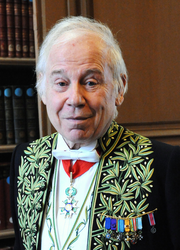
🌐follow Marie-Anne Frison-Roche on LinkedIn
🌐subscribe to the Newsletter MAFR Regulation, Compliance, Law
____
► Full Reference: M.-A. Frison-Roche, "François Terré. In memoriam", D. 2024, p. 1028
____
🌞read the in memoriam published in the Recueil Dalloz on June 6, 2024 (in French)
________
Sept. 21, 2022
Thesaurus : Doctrine
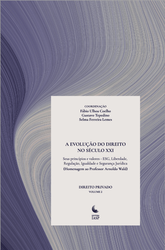
► Référence complète : A Evolução do Direito no século XXI. Seus princípios e valores: ESG, Liberdade, Regulação, Igualdade e Segurança Jurídica. Homenagem ao Professor Arnoldo Wald, vol. 2, Direito Privado, São Paulo, Editora IASP, 2022, 1998 p.
____
____
📗lire le sommaire de l'ouvrage
____
► Résumé de l'ouvrage (fait par l'éditeur) : "A presente obra reúne artigos de juristas e de alguns amigos do Professor Arnoldo Wald, abrangendo Ministros do Supremo Tribunal Federal e do Superior Tribunal de Justiça e outros magistrados, assim como professores das Faculdades de Direito, árbitros e advogados tanto nacionais como estrangeiros.
O livro abrange os mais diversos assuntos nos campos do Direito Privado e do Direito Público. Inclui também a republicação de alguns estudos de autores que não puderam apresentar a sua contribuição, mas que, em outras ocasiões, se manifestaram a respeito dos trabalhos do homenageado.
A obra é composta também por Prefácios e Apresentações dos diversos livros do Professor Wald, que testemunharam, durante 70 anos, a sua atividade cultural e profissional.".
____
📝lire une présentation de l'article de Marie-Anne Frison-Roche "Compliance, the new legal way for human values: towards an Ex Ante Responsibility"
________
Sept. 17, 2021
Thesaurus : Doctrine

► Full Reference complète : Beaussonie, G., Do Criminal Law and Compliance form a system?, in Frison-Roche, M.-A. (ed.),Compliance Monumental Goals, series "Compliance & Regulation", Journal of Regulation & Compliance (JoRC) and Bruylant, to be published.
___
► Article Summary: By nature, Criminal Law is a system that is not intended to develop, principles which limit it being internal to it. Nevertheless if Proportionality is respected, its extension may be legitimate to preserve “fundamental social values” because Criminal Law is the branch of Law concerning what is grave, grave in consequences as in causes.
Not always being concerned by Efficiency, the temptation is important to supplement Criminal Law with other repressive mechanisms , not only Administrative Repression but today Compliance which pursues concordant objectives and aims by the "Goals Monumental ”to what would be most important and therefore for which Efficiency would be required, in particular because victory (for example against corruption) should be global.
Efficiency is obtained by the internalisation in powerful companies, but this efficiency comes at a price and Criminal Law should not impose too many obligations to do maintaining only a potential link with the commission of a "real offense ”. Its association with Compliance can therefore also only be exceptional and must not lead to forget that Freedom must always remain the principle.
____
📝 Read the general presentation of the book in which this article is published.
______
Sept. 1, 2021
Compliance: at the moment

► An article published on July 14, 2021 by The Wall Street Journal, "Brain Implant Lets Man 'Speak' After Being Silent for More Than a Decade", relays the information that it is now possible, on an experimental basis, to implant in the brain a device allowing a person deprived by a neurological accident to speak to be able to express himself again by writing his thoughts directly on a computer screen, on which the words thought are displayed in sentences.
____
Several years of "fundamental" research, notably on the part of Facebook, which, in particular by subsidizing the French professor of neurosciences Stanislas Dehaene, in a comparison between the learning development of the brain and the development of "deep learning", have been successful. to allow people who have lost the use of the voice to write directly on screens without this vocal medium by going directly from thought to writing.
This leads to three reflections, putting Law and Technology at the center:
1. at first glance, speech being only a medium between thought and expression, it would be conceivable to do without it;
2. However, it is required to draw a parallel with the new technology of "emotional recognition" by which thoughts are accessible to third parties, which thwarts the fundamental right to make one's thoughts inaccessible to others;
The news has shown precisely that this technology, making possible to capture the true thoughts of others despite feigned facial expressions, poses a problem with regard to the fundamental right to lie or to remain silent (see in this regard 📧 MaFR, "Compliance and Ethics Technologies may be inadmissible "in themselves" and conceiving of their "ethical use" is therefore not admissible: practical case on the control of workers' emotions ").
3. By anticipating the possible use of this new technology and the legal reaction to this potentiality, the same question raises whether, per se, such an implantation of a tool for "capturing thoughts directly in the brain" to obtain their "direct translation on a screen" should not be considered as the equivalent of capturing thoughts, just as infringing on everyone's fundamental right to keep their thoughts inaccessible.
Here again, the fact that in one or two cases, this made it possible to cure a person does not legitimize the technology in itself.
Likewise, the fact that the person "consents" is not sufficient to legitimize what may be a per se attack on the dignity of the human person if the technology has the effect of capturing thoughts with a loss of control. the person concerned. For the moment, in the description given by the researchers according to the article which relates the innovation, it is the transmitter who controls the technology but the elimination of the medium of speech or writing deserves to be conceptualized, in the loss of isolation of the individual, isolation to which the Western tradition has often associated Freedom.
_____
Aug. 30, 2021
Compliance: at the moment

► An article from March 3, 2021, Smile for the camera: the dark side of China's emotion-recognition tech, then an article from June 16, 2021, "Every smile you fake" - an AI emotion - recognition system can assess how "happy" China's workers are in the office describes how a new technology of emotional recognition is able, through what will soon be out of fashion to call "facial recognition", to distinguish a smile that reflects a mind state of real satisfaction from a smile which does not correspond to it. This allows the employer to measure the suitability of the human being for his or her work. It is promised that it will be used in an ethical way, to improve well-being at work. But isn't it in itself that this technology is incompatible with any compensation through ethical support?
The technology developed by a Chinese technology company and acquired by other Chinese companies with many employees, allows to have information on the actual state of mind of the person through and beyond his or her facial expressions and bodily behavior.
Previously, the technology of emotional recognition had been developed to ensure security, by fighting against people with hostile plans, public authorities using it for example in the controls at airports to detect the criminal plans which some passengers could have.
It is now affirmed that it is not about fighting against some evil people ("dangerousness") to protect the group before the act is committed ("social defense”) but that it is about helping all workers.
Indeed, the use that will be made of it will be ethical, because first the people who work for these Chinese companies with global activity, like Huawaï, do it freely and have accepted the operation of these artificial intelligence tools (which is not the case with people who travel, control being then a kind of necessary evil that they do not have to accept, which is imposed on them for the protection of the group), but even and above all, the purpose is itself ethical: if it turns out that the person does not feel well at work, that they are not happy there, even before they are perhaps aware, the company can assist.
Let’s take this practical case from the perspective of Law and let’s imagine that it is contested before a judge applying the principles of Western Law.
Would this be acceptable?
No, and for three reasons.
1. An "ethical use" cannot justify an unethical process in itself
2. The first freedoms are negative
3. "Consent" should not be the only principle governing the technological and digital space
I. AN "ETHICAL USE" CAN NEVER LEGITIMATE AN UNETHICAL PROCESS IN ITSELF
These unethical processes in themselves cannot be made "acceptable" by an "ethical use" which will be made of them.
This principle was especially reminded by Sylviane Agacinski in bioethics: if one cannot dispose of another through a disposition of his or her body which makes his or her very person available (see not. Agacinski, S., ➡️📗Le tiers-corps. Réflexions sur le don d’organes, 2018).
Except to make the person reduced to the thing that his or her body is, which is not ethically admissible in itself, that is excluded, and Law is there in order to this is not possible.
This is even why the legal notion of "person", which is not a notion that goes without saying, which is a notion built by Western thought, acts as a bulwark so that human beings cannot be fully available to others, for example by placing their bodies on the market (see Frison-Roche, M.-A., ➡️📝To protect human beings, the ethical imperative of the legal notion of person, 2018). This is why, for example, as Sylviane Agacinski emphasizes, there is no ethical slavery (a slave who cannot be beaten, who must be well fed, etc.).
That the human being agrees ("and what about if it pleases me to be beaten?") does not change anything.
II. THE FIRST FREEDOM IS THE ONE TO SAY NO, FOR EXAMPLE BY REFUSING TO REVEAL YOUR EMOTIONS: FOR EXAMPLE HIDING IF YOU ARE HAPPY OR NOT TO WORK
The first freedom is not positive (being free to say Yes); it is negative (being free to say No). For example, the freedom of marriage is having the freedom not to marry before having the freedom to marry: if one does not have the freedom not to marry, then the freedom to marry loses any value. Likewise, the freedom to contract implies the freedom not to contract, etc.
Thus, freedom in the company can take the form of freedom of speech, which allows people, according to procedures established by Law, to express their emotions, for example their anger or their disapproval, through the strike.
But this freedom of speech, which is a positive freedom, has no value unless the worker has the fundamental freedom not to express his or her emotions. For example if he or she is not happy with his or her job, because he or she does not appreciate what he or she does, or he or she does not like the place where he or she works, or he or she does not like people with whom he or she works, his or her freedom of speech demands that he or she have the right not to express it.
If the employer has a tool that allows him or her to obtain information about what the worker likes and dislikes, then the employee loses this first freedom.
In the Western legal order, we must be able to consider that it is at the constitutional level that the infringement is carried out through Law of Persons (on the intimacy between the Law of Persons and the Constitutional Law, see Marais , A., ➡️📕Le Droit des personnes, 2021).
III. CONSENT SHOULD NOT BE THE ONLY PRINCIPLE GOVERNING THE TECHNOLOGICAL AND DIGITAL SPACE
We could consider that the case of the company is different from the case of the controls operated by the State for the monitoring of airports, because in the first case observed people are consenting.
"Consent" is today the central notion, often presented as the future of what everyone wants: the "regulation" of technology, especially when it takes the form of algorithms ("artificial intelligence"), especially in digital space.
"Consent" would allow "ethical use" and could establish the whole (on these issues, see Frison-Roche, M.-A., ➡️📝Having a good behavior in the digital space, 2019).
"Consent" is a notion from which Law is today moving away in Law of Persons, in particular as regards the "consent" given by adolescents on the availability of their body, but not yet on digital.
No doubt because in Contract Law, "consent" is almost synonymous with "free will", whereas they must be distinguished (see Frison-Roche, M.-A., ➡️📝Remarques sur la distinction entre la volonté et le consentement en Droit des contrats, 1995).
But we see through this case, which precisely takes place in China, that "consent" is in Law as elsewhere a sign of submission. It is only in a probative way that it can constitute proof of a free will; this proof must not turn into an irrebuttable presumption.
The Data Regulatory Authorities (for example in France the CNIL) seek to reconstitute this probative link between "consent" and "freedom to say No" so that technology does not allow by "mechanical consents", cut off from any connection with the principle of freedom which protects human beings, from dispossessing themselves (see Frison-Roche, M.-A., Yes to the principle of will, No to pure consents, 2018).
The more the notion of consent will be peripheral, the more human beings will be able to be active and protected.
________
Dec. 8, 2020
Thesaurus : Doctrine

► Référence complète : J.-S. Bergé, "Variations sur les libertés économiques", in J.-B. Racine (dir.), Le droit économique au XXIe siècle. Notions et enjeux, LGDJ, coll. "Droit & Économie", 2020, pp. 479-491
____
📕consulter une présentation générale de l'ouvrage, Le droit économique au XXIe siècle. Notions et enjeux, dans lequel cet article est publié
____
► Résumé de l'article :
____
🦉Cet article est accessible en texte intégral pour les personnes inscrites aux enseignements de la Professeure Marie-Anne Frison-Roche
________
Sept. 9, 2020
Newsletter MAFR - Law, Compliance, Regulation

Full reference: Frison-Roche, M.-A., Freedom&Media: when Italian Media Regulation's real "goal" is not Pluralism Protection, Freedom of Establishment prevails (CJEU, 3 Sept.2020,Vivendi), Newsletter MAFR - Law, Regulation, Compliance, 9th of September 2020
Read by freely subscribing other news of the Newsletter MAFR - Law, Regulation, Compliance
Summary of the news
The media sector is organized on an equilibrium between the principle of competition and other concerns like information pluralism. Generally, competition Law by making market accessible to many competitors ensures information pluralism. But, this is not the case if an operator get an excessive market power, running risk not only for competition but also for information pluralism. It is the reason why the Italian legal system forbids the constitution of an operator gathering more than 40% of the total income generated by the media sector or more than 10% of the total income generated by the Italian communication sector.
In 2016, Vivendi, a French media group, got more than 28% of the Mediaset Group's actions and around 30% of its voting right. The Italian communication regulation authority sized by Mediaset demands in 2017 to Vivendi to ends its participations in the group Mediaset. Vivendi contested this decision before the regional administrative court which referred to the Court of Justice of the European Union in order to know if freedom of establishment can legitimately be discarded in favor of information pluralism in this concrete case. The Court of Justice answered, in a decision of 3rd of September 2020, that the restriction of the freedom of establishment can in principle be justified by a general interest objective such as information pluralism protection but that in this concrete case, this is not justified because the fact that a firm is committed in the transmission of contents does not necessarily give it the power to control the production of such contents.
We can learn three lessons form this case:
- The Court precises that even if the principle is the freedom of establishment, it is possible to discard it to protect information pluralism protection under the condition that the concerned member State do not use this legitimate power to create a political monopoly, the burden of proof falling on the person attacking national legislation and not on the Member State.
- The Court distinguishes transmission of contents and production of contents and explains that if the State rejects this decision, the burden falling to it to prove the concrete links between these two activities.
- This case shows that the power to share the respective places of the "principle" and of the "exception" always comes back to the judges.
Sept. 8, 2019
Blog

I go. In accordance with the European Regulation (GDPR) transposed into French legal system, the site informs that there is possibility for the user to accept or refuse the use of their personal data for the benefit of "partners".
If they continue reading, the user is supposed to accept everything, but they can click to "customize".
I click: there I find two options: "accept everything" or "reject everything". But the "reject all" option is disabled. It is only possible to click on the "accept all" option.
It is stated in a text, which can not be copied, that these "partners" can use my data without my consent and for purposes that they do not have to inform me. But, again, these things I can "refuse everything". Here again the "reject all" mention exists but the fonctionality is not active, while the mention "accept all" is an active fonctionality.
While believing to read a free article on the "right of the trees".
At the end, I do not read this article, since I did not click on the only active buttons: "accept everything".
In exchange for a whimsical article about trees and their rights, or creams to be always young, or celebrities who change spouses, or about so-called tests to find what king or queen you should be if the all recognized all your merits, etc.
Proposed on the digital news feed by unknown sites; in partnership with foreign companies that you will never reach.
And mass-viewed by Internet users who are also told that "consent" is the proven solution for effective protection ....
While these are just panels hastily built by new Potemkins ...
Oct. 10, 2018
Thesaurus : Doctrine

► Référence complète : M. Fabre-Magnan, L'institution de la liberté, PUF, 2018, 352 p.
____
____
📗lire la table des matières de l'ouvrage
____
► Résumé de l'ouvrage (fait par l'éditeur) : "L’interdit est-il l’ennemi de la liberté ? Celle-ci est-elle toujours du côté du permis ? Cet ouvrage montre que la réponse à ces questions n’est pas si simple. Le consentement et le contrat ne suffisent pas à garantir la liberté, et ils en sont même parfois les fossoyeurs ; à l’inverse, l’interdit ou la dignité n’en sont pas toujours les ennemis.
La simple non-ingérence de l’État ne suffit en réalité pas pour assurer l’autonomie des personnes et le pluralisme des choix de vie. Le droit a alors un rôle à jouer pour soutenir la liberté, entendue comme le projet et le processus d’émancipation de tous et de chacun. La liberté des modernes et les droits de l’homme doivent être défendus. Mais conforter les acquis de la liberté individuelle suppose de s’intéresser à ce dont elle a besoin pour être instituée, et ce afin d’éviter qu’elle ne se délite ou ne se retourne contre les plus faibles. La liberté ne peut pas être la liberté de détruire ce qui protège et garantit la liberté.".
________

Aug. 2, 2018
Publications
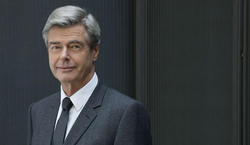
► Complete reference: Frison-Roche, M.-A., Yes to the principle of the will, No to the pure consents, working document for an article written in French Oui au principe de volonté, Non aux consentements purs, to Mélanges dedicated to Pierre Godé, 2018, available at http://mafr.fr/ en / article / yes-in-principle-of-the-desire-not in the consent /
► Summary: Pierre Godé devoted his thesis to defend the freedom of the human being, freedom that the person exercises by showing his will. This will manifests itself, even tacitly, by this trace of "consent". In a liberal society, politically and economically, that is to say a society based on the principle of the will of the person, consent must always be defined as the manifestation of the will, this link between consent and will being indivisible ( I). But by a perversion of liberalism, "consent" has become an autonomous object of the freedom of the person, mechanical consent that has made it possible to transform human beings into machines, machines to desire and machines to be desired, in a world of " pure consents","where we keep clicking, consenting to all without ever wanting. This consent, which has been split from the free will of the person, is the basis of the markets of the Human and the illiberal democracies, threats against human beings (II). The future of Law, in which Pierre Godé believed, is to continue to aspire to protect the human being and, without countering the free will of the human being as the movement of the law of the consumption had been tempted to, to renew with a liberal movement of Law and to fight against these systems of pure consents (III).
🔻read the article below (in French).
June 6, 2018
Thesaurus : Doctrine
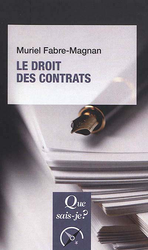
Référence complète : Fabre-Magnan, M., Le droit des contrats, coll. "Que sais-je ?", ed. PUF, 2018, 128 p.
« On lie les bœufs par les cornes, et les hommes par les paroles », disait le juriste Loysel en 1607. Toute l’ambivalence du contrat est là. En échangeant leurs paroles, les hommes s’engagent et se lient les uns aux autres. Par leur parole encore, ils peuvent se projeter dans l’avenir et tenter d’avoir prise sur lui. Enfin, en respectant la parole qu’ils ont donnée, ils lui confèrent sa valeur, déterminant la nature de la relation qu’ils ont nouée avec les autres.
Le « droit des contrats » désigne ainsi le « droit des obligations librement consenties », en d’autres termes le droit des engagements volontaires. Mais la liberté de se lier ne serait-elle pas un oxymore ?
Au droit revient la tâche de canaliser et de garantir la parole donnée, et ce faisant d’articuler tous les mots qui disent le contrat, à commencer par la liberté, la volonté, la force obligatoire, la loi et, bien sûr, la justice.
April 8, 2018
Blog

La presse générale s'en émeut grandement aux Etats-Unis.
Par exemple le Times.
En effet, la Constitution est ce qui fait l'unité du Peuple américain, alors même qu'il s'agit à la fois d'une structure politique fédérale et d'une société à la fois divisée racialement et fondée sur des communautés. Cette unité autour de la Constitution a été soulignée notamment par Hannah Arendt qui disait en 1973 qu'arrivant d'Europe, lieu des Etats-Unis, elle était avant tout frappée par cette unité autour de la Constitution, "document sacré", ce qui est difficile à comprendre pour un étranger, car c'est la Loi qui règne et non pas les hommes".
Décrivant le système politique libéral américain, John Rawls souligne de son côté que chaque communauté devait vivre selon ses propres règles (à chacun selon son petit contrat social, en quelque sorte), l'unité se faisant autour de quelques principes et droits unifiant l'ensemble : la Constitution.
Il est donc acquis qu'aux Etats-Unis, s'il y a quelque chose qui est "pris au sérieux" pour tous, qu'il soit citoyen ou Président, c'est la Constitution. Elle est l'intangible du système.
Les amendements qui y furent apportés font partie du bloc de constitutionnalité : le second amendement confère à chacun le droit constitutionnel de porter une arme, expression de son droit fondamental de se défendre son espace de liberté.
L'État du Massachusettsa adopté une loi pour interdire le port d'armes mais a limité le champ de cette interdiction à une seule catégorie d'arme : les "armes d'assaut".
Cette loi étatique a été attaquée en alléguant une contradiction prétendue avec la Constitution et plus particulièrement le second Amendement de celle-ci. Le 5 avril 2018 le juge fédéral saisi d'une telle prétention a rejeté celle-ci en affirmant qu'une loi interdisant le port d'armes d'assaut ne méconnaît pas le droit constitutionnel du libre port d'arme.
Pour bien l'expliquer, l'attorney general de l'Etat du Massachusetts a donné une conférence de presse pour poser de vive voix comment le juge avait résolu cette "simple question" :
https://www.facebook.com/NowThisPolitics/videos/1998062733558540/
Comme le dit l'Attorney General, "I dit my job", c'est-à-dire utiliser le Droit pour atteindre le but, ici protéger les personnes (les préserver de la perspective d'être abattues par une personne utilisant contre elle une arme à d'autres fins que celle de se défendre) en demandant au juge qui dit la Constitution, c'est-à-dire le juge fédéral.
La "simple question" reçoit donc une réponse en fonction de l'interprétation et de la qualification de la situation que vise le Second Amendement.
____
Cela montre que si l'on veut limiter les effets délétères des armes aux Etats-Unis et faire échec aux multiples lobbies de l'industrie des armes qui s'exercent aussi bien sur les tribunaux que sur le Congrès, l'on doit non seulement espérer dans un Législateur qui en ait le courage, comme le demanda le Président Obama, dans une culture de la "régulation du port d'arme venant faire l'équilibre entre les libertés des uns et la protection des autres", mais encore dans ce que le pouvoir d'interprétation de la Constitution elle-même.
L'on retrouve ici une question très classique : comment faut-il interpréter la Constitution américaine ?
Il demeure acquis que le droit de porter une arme est un droit fondamental, que la Cour suprême protège.
Elle le fit notamment dans un arrêt essentiel de 2010, qui a interdit non seulement au Congrès de limiter ce droit, mais encore aux autorités locales et étatiques. Cette jurisprudence pourrait être remise en cause, non pas frontalement mais par l'art qui caractérise le Common Law : l'art de la "distinction".
En effet, la question est de savoir s'il ne faut pas "distinguer" parmi les "armes".
Il faut mais il suffit de se demander quelles étaient les "armes" que les pères fondateurs de la Constitution avaient à l'esprit lorsqu'ils ont conféré ce droit, en tant qu'il exprime le droit de tout citoyen de se défendre et d'exprimer ainsi sa liberté.
Dans les disputes célèbres entre Justice Scalia et Justice Breyer, que l'on soit comme le premier un adepte de l'interprétation "originaliste" de la Constitution, ou que l'on soit comme le second un adepte de l'interprétation "progressiste" de celle-ci, l'enjeu est toujours le même : que veulent dire les mots, puisque le Droit est un art pratique dont les éléments sont le langage
L'idée qui est ici retenue est que les armes qui ont été visées par les père fondateurs étaient des armes que les citoyens avaient à portée de main, qui faisaient partie de leur vie quotidienne. Pas les "armes d'assaut", qui soient des armes de guerre qui sont empruntées à un autre monde : celui de la guerre.
Dès lors, que l'on soit "progressiste", c'est-à-dire de ceux qui interprètent la Constitution en imaginant ce que les pères fondateurs auraient dit s'ils vivaient aujourd'hui, ou que l'on soit "originaliste", en se limitant à ce qu'ils ont voulu à l'époque, on en arrive à la même conclusion : les "armes d'assault" n'étaient pas dans leurs visées (conception originaliste) et ne seraient sans doute inclus dans ce qu'ils auraient conçu comme un continuum entre la liberté de l'individu et le port d'arme. Car il s'agit de se défendre et non pas d'abattre des dizaines de personnes par des armes de guerre. Il s'agit de se défendre et non pas de faire la guerre.
Dès lors, la notion juridique d' "arme" se divise par une "distinction" en deux catégorie juridique : la première qui demeurerait constitutionnellement protégée par le 2ième Amendement, intouchable par le pouvoir législatif, fédéral et local, en tant qu'elle permet à l'individu de "défendre" sa liberté, et la seconde qui, relevant de l'activité guerrière et d' "attaque", laquelle peut être limitée.
L'art de distinguer et de créer des catégories, voilà l'art pratique du Droit.
C'est pourquoi le choix de la langue est le choix premier et que le choix de la langue anglaise est déjà avoir choisi le système britannique. Enseigner ou se référer au Droit français en utilisant l'anglais, c'est le manier comme un droit étranger.
Nov. 14, 2017
Thesaurus : Doctrine
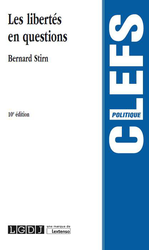
Référence complète : Stirn, B., Les libertés en questions, coll."Clefs", LGDJ-Lextenso, 10ème édition, 2017, 312 p.
Lire la quatrième de couverture.
Consulter la table des matières.
Aug. 29, 2016
Thesaurus
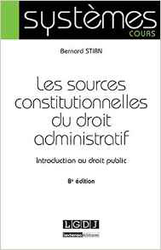
Référence complète : Stirn, B., Les sources constitutionnelles du droit administratif, 9ième éd., coll. "Systèmes", LGDJ - Lextenso, 2016, 191 p.
Oct. 31, 2014
Blog

Les systèmes politiques sont désorientés face aux mouvements terroristes nouveaux, notamment celui qui a l'audace de prendre l'appellation d'État islamique.
Les États pensent à des solutions, mais la difficulté vient du fait que les personnes auxquelles ils sont confrontés n'ont pas encore commis d'actes. Leur acte consiste à partir pour rejoindre un mouvement, concrétisation de leur liberté d'aller et venir. Certes, l'État sait que ce déplacement n'a de sens que pour participer à des actions interdites, à savoir tuer en masse. Mais "sur le moment", l'acte en lui-même ne semble pas répréhensible.
Le Royaume-Uni a l'ingéniosité de faire renaître l'interdiction de la "double allégeance" pour affirmer que le seul fait de prétendre agir par obéïssance à un autre que la Couronne suffit à constituer un acte criminel (la "Haute trahison").
Dans sa chronique du 31 octobre 2014, Brice Couturier se demande s'il convient de "juger les jihadistes plutôt que de les refouler".
En effet, et d'une façon logique, il se demande s'il ne convient pas, plutôt que de restreindre leur liberté d'aller et de venir, de les laisser partir, passivement en les empêchant, peut-être activement en les autorisant. Si par la suite, s'il s'avère qu'ils commettent des actes répréhensibles, dans ce second temps, il sera possible, adéquat de les appréhender et de leur reprocher efficacement l'acte criminel enfin perpétré.
Brice Couturier affirme que cela serait plus légitime que de procéder comme le fait le projet de loi de lutte contre le terrorisme, déjà votée par l'Assemblée Nationale le 29 octobre 2014 et soumis désormais au Sénat.
En effet, ce texte réprime un comportement consistant notamment à consulter des sites Internet, à préparer des explosifs, à détenir des armes, à repérer des cibles, etc., sans qu'un acte ait été encore commis. Pour les pénalistes, cela n'est pas conforme à l'exigence du droit pénal classique, lequel exige un acte pour que la personne soit sanctionnée. La seule intention ne peut justifier une condamnation. L'infraction comprend non seulement l'élément légal et l'élément intentionnel, mais encore l'élément matériel. Nous verrons ce que le Conseil constitutionnel en dira.
Mais suivons ce raisonnement. Plutôt que de sanctionner avant l'acte, expulsons les personnes pour mieux qu'elles le commettent et ainsi, dans le respect de Beccaria, les sanctionner par la suite, les trois attributs de l'infraction étant réunis.
Comment attrape-t-on les personnes ayant rejoint le mouvement terroriste, à la fois international et infiltré, une fois que l'État a concrétisé leur liberté d'aller et venir par le biais paradoxal de l'expulsion ?
Updated: July 31, 2013 (Initial publication: Sept. 20, 2011)
Teachings : Les Grandes Questions du Droit, semestre d'automne 2011

Updated: July 31, 2013 (Initial publication: Nov. 22, 2011)
Teachings : Les Grandes Questions du Droit, semestre d'automne 2011

Updated: July 31, 2013 (Initial publication: Sept. 6, 2011)
Teachings : Les Grandes Questions du Droit, semestre d'automne 2011

June 18, 2012
Publications
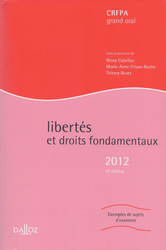
Lire la présentation de l'article de Marie-Anne Frison-Roche : Le droit d'accès à la justice et au droit.
Lire la présentation de l'article de Marie-Anne Frison-Roche : Le droit à un tribunal impartial.
Lire ci-dessous la description générale de l'ouvrage.
July 6, 2011
Publications
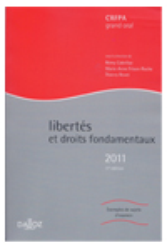
Référence complète : CABRILLAC, Rémy, FRISON-ROCHE, Marie-Anne, REVET, Thierry (dir.), Libertés et droit fondamentaux, 17ième édition, Dalloz, 2011, 918 pages.
Lire la quatrième de couverture,
Lire le sommaire de l'ouvrage,
Lire la présentation de l'article de Marie-Anne Frison-Roche : Le droit d'accès à la justice et au droit",
Lire la présentation de l'article de Marie-Anne Frison-Roche : Le droit à un tribunal impartial,
Lire la présentation de l'édition suivante de l'ouvrage.
Lire ci-dessous la présentation générale de l'ouvrage.